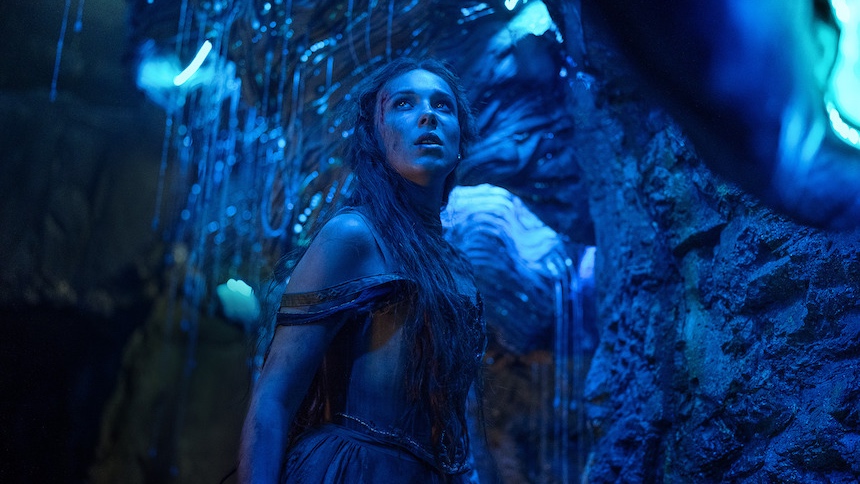DAMSEL Review: Millie Bobby Brown Stars in Middling Dark Fantasy

At 20, Millie Bobbie Brown, the erstwhile breakout star of Netflix’s Stranger Things, has co-starred in two kaiju-themed blockbusters (Godzilla vs. Kong, Godzilla: King of the Monsters), and not only headlined two made-for-Netflix young-adult adventure-dramas, Enola Holmes I and II (a third will follow soon) but also made a smartly calculated move into the producer’s chair.
Producing gives Brown a level of freedom few stars her age enjoy, but with that freedom, of course, comes responsibility, responsibility to her financial backers and a reasonable rate of return along with maintaining — not to mention growing — her fanbase beyond Stranger Things or her other efforts.Brown’s latest attempt at brand cultivation, Damsel, however, might not obtain the results either Brown or Netflix wanted.
A middling, mediocre, low-energy effort, Damsel has all the ingredients for a successful standalone film, including princes and princesses, castles and kingdoms, and knights and dragons. Superficially subversive, Damsel upends fairy-tale elements, turning Brown’s character, Princess Elodie, from the damsel (in distress) of the title into a modestly fierce warrior, fighting an ornery, cave-dwelling dragon to the death or its nearest approximation.
When we first meet Elodie, she’s doing her part to keep her father’s struggling kingdom from disintegrating, chopping wood from what’s left of a nearby denuded forest. The stewardship of the land under Elodie’s father, Lord Bayford (Ray Winstone), hasn’t progressed particularly well.
Lord Bayford seems to care for his immediate family, Elodie, her younger sister, Floria (Brooke Carter), and their stepmother, Lady Bayford (Angela Bassett), but that’s where Lord Bayford’s positive qualities end, allowing short-sighted policies and poor planning to leave his kingdom in the direst of straits, without enough wood to survive a freezing winter or enough food to feed his people.
That’s where another, far more wealthy kingdom, Aurea, comes in. The island kingdom of Aurea bursts with overabundance, from the finery worn by one and all alike to the conspicuous amounts of uneaten food that seemingly lie everywhere, and everything in between. Marrying Elodie to Aurea’s bachelor prince, Henry (Nick Robinson), and joining a royal family led by Queen Isabelle (Robin Wright) and her silent consort, King Roderick (Milo Twomey), seems like a no-brainer.
Except, of course, the decision involves a Faustian bargain. In exchange for Elodie’s hand in marriage, Lord Bayford and his kin can return to their kingdom laden with gold. Elodie, however, will remain behind to participate in an ancient ritual involving a mountain, a cave, and a dragon who’s developed a taste for human flesh, especially of the royal or royal-adjacent kind. Young women have been sacrificed to the dragon for several hundred years, making Elodie one of many, an assembly line of princesses, married to a handsome prince one moment, sacrificed the next, and forgotten soon thereafter.
Refusing to accept her role as a sacrificial victim and instead embracing self-empowerment (literally at times), Elodie decides to fight, first the dragon and later, when time and circumstances allow, the duplicitous royals who tried to send Elodie to her doom. First, Elodie must survive via her wits, her strength, physical, mental, and emotional, and the sheer luck (i.e., plot armor) enjoyed by fictional heroes and heroines since storytelling became a pastime for our hominid ancestors tens of thousands of years ago.
Not quite sunk, but not elevated by Dan Mazeau’s (Fast X, Wrath of the Titans) rote, by-the-numbers screenplay or Juan Carlos Fresnadillo’s (Intruders, 28 Weeks Later, Intacto) competent anonymity behind the camera, Damsel stumbles from one revelation to another, each one long foreshadowed and thus anticipated by even the least attentive watcher. The film stops periodically for Elodie and the dragon to tussle or exchange words (yes, like Tolkien’s gold-hoarding Smaug, this dragon talks), before moving on to a wearyingly overindulgent third act and a denouement shamelessly ripped from the pages of George R.R. Martin’s still uncompleted Game of Thrones mega-series.
Almost as badly, the visual effects often have a rushed, under-rendered feeling. Presumably hampered by a limited budget, Fresnadillo smartly keeps the dragon half-hidden or in the shadows for much of Damsel’s running time.
The few remaining shots oscillate between the passable to the cringe-worthy. Likewise, repeated shots of characters inside the cave too often look to be pasted into a hastily rendered background. At least, though, most of Brown’s cave scenes unfold inside an actual set, occasionally augmented by CGI (rather than the other way around).
When and where the CGI falters around Brown, she does her level-best to make Elodie’s journey from working-class princess to warrior princess persuasive. Brown often has to carry scenes by herself or interact with offscreen characters, like the dragon who hides and skulks around the cave system, the better to save the animation team time and more importantly, money for the film’s backers, including Netflix.
Ultimately, that leaves Damsel in the same position as the vast multitude of straight-to-Netflix films: disposable entertainment best left on to keep teens, preteens, and even toddlers engaged for the better part of two hours. For everyone else, Damsel will qualify as nothing more and nothing less than background fodder.
Damsel begins streaming Friday, March 8, on Netflix.







